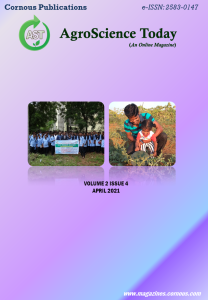Green graduation is a new vista in the field of tree planting where every graduating student from an Agricultural University may have to plant a sapling as soon as he/she enters the university and nurture it until his/her stay. Being a four year professional course, the sapling planted can get established by the time student completes the degree. This act shall help in increasing the green cover, feeling for students to be close to nature and also help in biodiversity conservation. If the species are chosen and include some endangered species, green graduation can also act as a conservation of endangered species. Further, if it is made as mandate by ICAR, it can be eventually a big program at national level towards biodiversity conservation. One such initiative designed from UAS, Raichur has been discussed in the present report.
On the global scale of food security and safety and the continuous growth of the population worldwide, potential agriculture production is pre requisite to meet the global demand in a sustainable manner. As, majority of world population belongs to developing and under developed countries where undernourishment is common, it needs keen attention of government, industry and consumer in procuring food in right proportion to every individual. In order to meet the per capita food requirement of vast population some degree of technological innovation should be effectuated such as adoption of biotechnological tools and the implementation of IPM (Integrated Pest Management) methods keeping in view the concerns of environment and public welfare. For the decade, climate change and uneven use of agrochemicals has equally affected the agricultural land, the produced food grain as well as human health. The irrational application of chemicals since 1960s to double the produce has definitely achieved the food requirement of the population to some extent but it has added serious health issues among every section of the country. Hence, to curb the global issue of pest management it requires active coordination among nation to speculate and devise the alternatives to overcome the future consequences of the present. Allocating the whole responsibility in one’s hand is precarious so it is the responsibility of every individual nation to speculate and derive better means to evaluate the sensitive issue of today to harness the healthy tomorrow. On the part of it, international organizations would play crucial role as they excel in capacities, they better manage and coordinate and take the leadership on behalf of the rest of the country.
In India there are seven edible oil seed crops, namely groundnut, rapeseed & mustard, soybean, sunflower, sesame, safflower and niger, blessed by the benefit of the diverse agro-climatic areas. Oilseeds are important segment of tropical agriculture as they provide access to nutrition through protein and oil to humans and livestock. Edible oils are crucial for human nutrition, as they are energy dense with a high fat content. Human body needs some of the vital acids like Poly Unsaturated Fatty Acids (PUFA), which are not synthesized by the human body on its own, which obligates us to take from external sources. As vegetable oils are excellent source for PUFA, Mono-unsaturated fatty acids, Vitamins and others, an attempt was made to highlight the core health benefits of major vegetable oils.
Oil palm not only high in its oil production, but also produce large quantity of agriculture wastes like oil palm leaves, empty fruit bunches and trunk. The more fibrous wastes generated from empty fruit bunch, leaves etc. are generally make use in different purposes like a mulching of leaves around the palm basins to conserve moisture as well to add organic matter to the soil. For production of biodiesel and biofuel the oil palm byproducts like shells, trunks etc. waste matter produced from oil palm. The organic rich waste products of oil palm can be utilized for electricity generation, piggery industry, as a fuel in boilers as an eco-friendly fuel and in many ways. The waste generated from the palm oil mills like decanter cake, empty fruit bunches after oil extraction, waste water from mill, mesocarp fibre, left over kernel cake after oil extraction, shells etc. byproducts plays an important environmental effects globally. As a consequence over there, the oil palm waste management in different stages is very essential to tackle this waste eco-friendly.
Since the demand for the seedless watermelon is increasing in the international market, there is a need for the development and production of the seedless hybrids. The seedless watermelons have high commercial value currently and also in future. Plant breeding programmes needs more precise and advanced techniques for the improvement especially in the watermelon crop improvement such as tetraploid development. Tetraploid development is the first and typical phase for the seedless watermelon hybrid development. Generation of meiotically stable tetraploid lines development and stabilization is a big and tedious task in the seedless watermelon development programmes.
